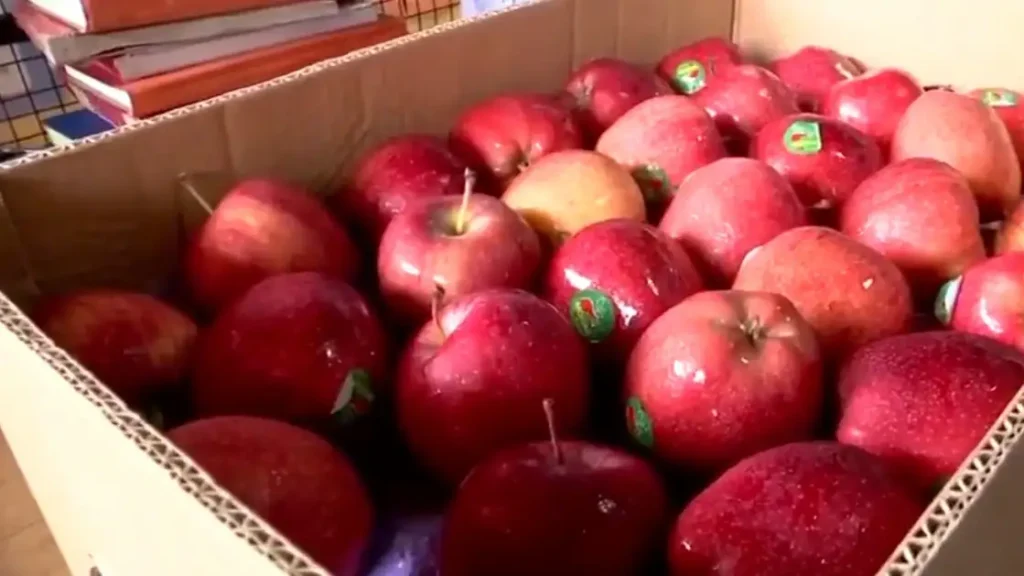Delhi’s Azadpur Traders Halt Turkish Apple Imports Over Geopolitical Strain
In a bold show of national solidarity, fruit merchants at Delhi’s Azadpur Mandi — Asia’s largest wholesale fruit and vegetable market — have decided to stop importing apples from Turkey. This step follows recent comments by Turkish leadership that many Indians view as interference in domestic matters, especially concerning Kashmir.

Traders Take a Stand Against Turkey
Chairman of the Azadpur Fruit Market Association, Meetha Ram Kriplani, said traders have voluntarily chosen to stop ordering Turkish apples. “As responsible citizens, we cannot support trade with a country that sides with Pakistan on issues that are internal to India,” Kriplani stated.
This move isn’t backed by a government directive. Instead, it’s a self-initiated decision by the trading community to express disapproval of Turkey’s political stance. Traders say they want to send a strong message through this economic gesture.
What Sparked the Boycott?
The decision comes in response to Turkish President Recep Tayyip Erdoğan’s repeated support for Pakistan’s position on Kashmir. He raised the issue at the United Nations and made similar comments in other international forums. India has consistently opposed such interventions, maintaining that Kashmir is strictly an internal matter.
These remarks have not only angered Indian policymakers but also triggered reactions from civil society and businesses. For the traders in Delhi, this boycott is their way of pushing back.
Turkish Apples in Indian Markets
Over the past few years, Turkish apples had found a niche in Indian fruit markets. They arrived mainly during the off-season and competed with imports from Iran, Chile, and the United States. Turkish apples are known for their appearance and long shelf life, making them popular in both wholesale and retail sectors.
Now, Azadpur traders say they will replace Turkish imports with apples from domestic regions and other allied countries. “We will promote apples from Himachal Pradesh and Jammu & Kashmir. They are high in quality and grown right here at home,” said Sandeep Sharma, a trader with over two decades of experience.
Boost for Indian Apple Farmers
By halting Turkish imports, the traders believe they will give local apple growers a much-needed boost. Domestic farmers often struggle with price drops during peak season due to the influx of imported fruit. Cutting off one major source of competition could help stabilize prices.
“This is the right time to focus on local produce. Our farmers grow world-class apples. Supporting them strengthens our economy and reduces dependence on foreign sources,” said agricultural analyst Rajeev Verma.
Traders also believe this decision aligns with the larger “vocal for local” movement that encourages citizens and businesses to prioritize Indian goods and services.
Mixed Reactions Within the Market
While many merchants have welcomed the move, some raised concerns about supply gaps and seasonal availability. “It’s a patriotic gesture, but we must ensure consistent supply and price stability,” said Nadeem Khan, a fruit supplier who previously dealt with Turkish exporters.
Despite such concerns, most traders support the idea of prioritizing national interest over short-term convenience. “We’re ready to make a small sacrifice if it means standing by our country,” said Manoj Tiwari, another merchant at the market.
Symbolic Yet Significant
Although Turkish apple exports to India make up a small part of their global trade, the boycott carries symbolic weight. It shows that geopolitical choices can influence grassroots commerce. This is not the first time Indian traders have taken such steps. In the past, many markets reduced imports from China following border tensions.
These decisions may not create major economic ripples abroad, but they reflect growing awareness and involvement of Indian businesses in global issues.
Will the Boycott Spread?
The Azadpur traders’ move could inspire similar actions in other parts of the country. If more markets follow suit, it might significantly impact Turkish fruit sales in India. For now, however, this remains a localized response, driven by a sense of patriotism.
Local apple growers, especially those in Kashmir and Himachal, stand to benefit the most. With more shelf space and higher demand, they may see better returns during this fruit season.
Final Thoughts
What began as a diplomatic disagreement has now influenced trade decisions at the grassroots level. Azadpur Mandi’s traders have turned their market into a platform for national expression. Their refusal to deal in Turkish apples highlights how business, politics, and public sentiment are becoming more interconnected.
In a world where consumer choices often reflect deeper values, even a fruit market can become a space for protest. The traders’ decision underscores a powerful message: India’s unity and dignity come before commercial gains.






